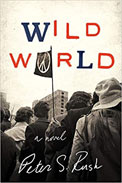
 |
A young man's journey from intellectual observer to committed participant is explored in this chronicle of America's chaotic times in the early 1970s. As the Vietnam War becomes more involved and less popular, its effects begin to change lives in the United States as well as Southeast Asia. College campuses become hotbeds of dissent and protest. Then, when four students at Kent State are shot and killed by the National Guard, one individual is forced to look within himself to determine whether his approach to life will be simply cerebral or as real as it gets.
Steve is a college senior in Providence, Rhode Island. He is head over heels in love with Roxy, a young medical student. Both of them, as well as their friends at university, are deeply anti-war. They attend protests and talk endlessly about the suffering of the Vietnamese, the tragic waste of American lives, plus the ineptitude and corruption of their own governmental organizations. However, one day, they attend a lecture by a New York policeman who has gone against the grain and become noteworthy for fighting corruption from within the NYPD. Steve is surprisingly moved. He realizes that experiencing life from the safe confines of ivory tower universities may well distort, rather than enhance, a life well-lived. So he abandons his longtime plan to attend law school and joins the Providence Police Force, where he hopes to actually make a difference, rather than just pontificating about doing so.
Steve soon comes to realize, though, that he is indeed a stranger in a strange land. Far more educated than most officers, he is met with continuing derision from those who see his well-stocked mind as irrelevant and his unbridled idealism as laughable. His cohorts immediately begin to school Steve in the best ways to shirk work, bust heads, take bribes, and look the other way when not doing so would upset corrupt apple carts or point fingers at individuals who are recognized as off-limits. Simultaneously, his university pals, even his lady love, begin to shy away from him. They see him as the opposition, as part of the establishment they rebel against. Before long, Steve finds himself in a situation where he has to decide just how true he wants to be to his values. He becomes involved in circumstances where doing the right thing may definitely be the most dangerous thing he can do. Does he truly have the courage of his convictions? Or has it all been a failed experiment, a romantic premise explored but ultimately abandoned?
Rush is an accomplished storyteller, and he weaves a tale both memorable and believable. His characters are realistic. Their motivations and behaviors will likely come across as achingly familiar to many readers. When appropriate, he creates scenes that are taught and exciting, but he also depicts intimacy with warmth and understanding. Cleverly too, the author employs a literary device to excellent effect. He borrows his chapter headings from the titles and lyrics of popular songs of the period. Those of a certain age are immediately transported to their memories of that time, which music so aptly recreates in the mind.
This novel reconstructs what Bob Dylan so appropriately sang about when he intoned, "The times they are a changin." It's a story of self-discovery that will likely appeal to all who lived through or care about America's move from conformity to individual expression. For most Americans who were there, the experiences chronicled here could indeed be remembered as a wild world.